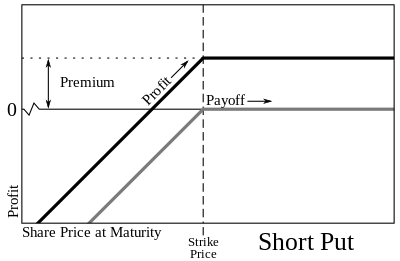

A covered option is a financial transaction in which the holder of securities sells (or "writes") a type of financial options contract known as a "call" or a "put" against stock that they own or are shorting. The seller of a covered option receives compensation, or "premium", for this transaction, which can limit losses; however, the act of selling a covered option also limits their profit potential to the upside. One covered option is sold for every hundred shares the seller wishes to cover.[1][2]
A covered option constructed with a call is called a "covered call", while one constructed with a put is a "covered put".[1][2] This strategy is generally considered conservative because the seller of a covered option reduces both their risk and their return.[1]
- ^ a b c MacMillan, Lawrence (2002). Options as a strategic investment (4th ed.). New York Institute of Finance. ISBN 978-0735202382.
- ^ a b Butler, Mike (2 February 2016). "Trading Strategy Covered Put". Tastytrade. Retrieved 10 April 2022.